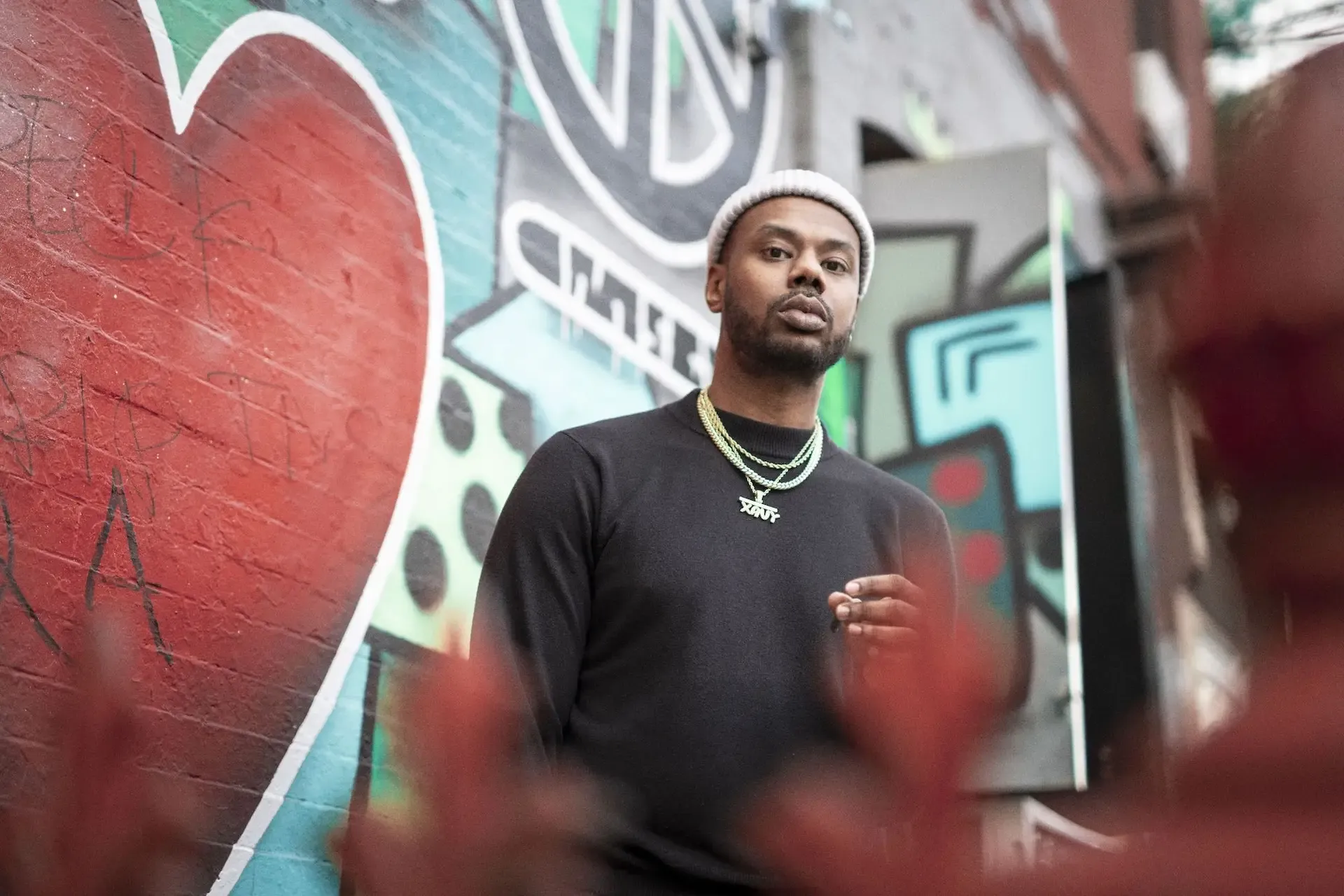Hip-hop: The heart & soul of modern Black history
Throughout Black History Month, we want to celebrate Black excellence and highlight some of Black culture's immense influence on our music scene. We're doing this by inviting guest writers to deep dive into three music genres that influenced the world: Hip Hop, R&B, and Afrobeat.

Throughout Black History Month, we want to celebrate Black excellence and highlight some of Black culture's immense influence on our music scene. We're doing this by inviting guest writers to deep dive into three music genres that influenced the world: Hip Hop, R&B, and Afrobeat. Let's hand over the mic to Sahmon Goodman and start off strong with the genre Hip Hop.
Every year during Black History Month, it is customary that we take the time to commemorate monumental Black Leaders, revolutionaries, inventors, artists, athletes, business moguls, and innovators. While there are so many brilliant minds dispersed throughout their respective industries and thrive within their unique platforms. A plethora of unsung heroes fit these descriptions reside within the pages in the history books that are dedicated to the phenomenon known as Hip Hop. A chapter within Black History has given so much and continues to bombard the world with a level of entertainment and activism tied with ingeniousness unlike any other.
The beginning
The creation of Hip Hop marked a pivotal moment in the evolution of Black Culture within America. With the Harlem Renaissance preceding the inception of Hip Hop, it was only a matter of time before African Americans sparked another cultural movement that bore the same seeds as its predecessor musically. However, instead of it being another Duke Ellington or Louis Armstrong to do it. Hip Hop was introduced to the world by a gentleman by the name of Clive Campbell, or as many others know him, “DJ Kool Herc.”
DJ Kool Herc is known as the pioneer and the father of the Hip Hop we see today. While the disco era dominated the late 60s and early 70s, there was a new underground sound that was being birthed within the walls of a house party in the Bronx in August of 1973. Herc’s ambition as a DJ was fueled by the rejection of the disco sound that was heavily played throughout the local radio stations and into the Bronx homes.
Due to his unwillingness to play disco, DJ Kool Herc developed a style of playing records that involved him only playing the breakdown section that consisted of the drums and bass. While Dj Kool Herc literally rocked the house with his records, he had help doing so with a man by the name of Coke La Rock, who is regarded as the first MC. Together, they planted and watered the seeds of the DJ and MC Hip Hop era throughout the late 70s and mid-80s.
Soon after, DJs such as Grandmaster Flash and Afrika Bambaataa followed DJ Kool Herc’s lead and carried on playing breakdown music for the people to dance and cut a rug to.
Hip Hop in the spotlight
While DJ’ing is what brought Hip Hop to the light, many people often think about the art of rapping when you mention it. An innocent mistake, but you can’t really blame them though. The DJ spinning the records and supplying the beats that make you want to move is one thing. But it was soon discovered that adding a smooth array of words that rhyme and flowed along the beats created a whole new experience for those in the crowd. An experience that made you feel like you were a part of the performance yourself.
Anthony Holloway aka “DJ Hollywood” is regarded as the first rhythmic rapper and the first King of Rap in New York. His contributions to Hip Hop are another reason as to how we have these interactive call and response lyrics within rap songs today.
DJ Hollywood’s innovative use of rapping is also what opened the doors to rappers such as Roxane Shante, The Mercedes Ladies, Kurtis Blow, The Fresh Prince, Salt N Pepa, LL Cool J, and Slick Rick.
With the help of Sugar Hill Records founder Sylvia Robinson, DJ Hollywood’s iconic rap style gave inspiration to the Sugar Hill Gang’s first rap hit single to reach the Billboard top 40, “Rappers Delight” in 1979. Fun fact, Rappers Delight was also Hip Hop’s first music video.
Moving with the times
Moving throughout the late ’80s and throughout the ’90s, Hip Hop began to grow its wings and expand to different locations around the country and into something more than what it was originally intended for. It began to shift and become rawer and more political to accurately reflect the plight that was felt at the time. It also gave room for a deeper form of self-expression in regard to relatability with the youth.
On the west coast, you had rappers such as NWA and Tupac who were exercising their form of activism against police brutality and the justice system. Public Enemy’s Sista Souljah also played a major role in articulating her thoughts concerning politics and race. On the east coast, you had rappers such as Nas, Jay Z, Tribe Called Quest, and The Fugees who were using their talents to spread meaningful or heartfelt messages in their songs.
Hip Hop culture in the ’90s also gave rise to the infamous east coast versus west coast dispute with rappers Tupac and Biggie in the middle of it. This time in history showcased a powerful mob mentality culture that Hip Hop could influence upon America as well.
With the influence rising and getting stronger, Hip Hop also found its way into the realm of television and film. Classic TV Shows such as Moesha, Martin, and even a child show such as Kenan & Kel found its world being shaped by the beats and rhymes of Hip Hop too with guess appearances from Rap artists. This presented yet another stage for artists to showcase their talents and build Hip Hop’s influence.
Hip Hop influence upon fashion was highly prevalent throughout the 90s and the early 2000s too. While rappers such as Kris Kross were promoting and influencing us to wear our clothes backward, in 2002 St. Louis rapper Nelly began the long-lasting Air Force One trend with his hit song as well. As music grew throughout the 2000s, the competitive edge took another turn with 50 Cent being the main instigator to inspire rappers to make hit songs. His debut album “Get Rich or Die Tryin” was the gas that lit the fuel and got the ball rolling in terms of rap artists focusing on constructing good structured songs that appealed to the people, along with some form of theatrics to promote it. Artists such as Missy Elliot, Busta Rhymes, and Janet Jackson gave the 2000s Hip Hop era a little more flavor in terms of creating their music videos to be just as enjoyable as their song.
What the future holds
Hip Hop today is more alive and vibrant than ever since its creation almost 50 years ago. Today we stand at the forefront of a new era that has a strong influence from the old one that DJ Kool Herc helped bring into the world.
Whether it’s J. Cole or Kendrick Lamar being the face of rap on the east and west coast, Megan Thee Stallion or Saweetie following in Roxane Shante’s footsteps as women in the rap industry, or Lil Nas X bringing back the enjoyment within music videos. All of these new artists can be regarded as true children of Hip Hop due to them studying the greats that have come before them and sticking near to their roots. Their contributions to the culture have even found their way across the seas around the world. I believe that with the new direction that Hip Hop is going in, there is no limit as to what heights can be reached. Especially with new-age social media pushing for more creativity, influence, and exposure for the culture.
Sahmon Goodman is a Fayetteville North Carolina native and senior at North Carolina A&T State University studying JOMC Mass Media Production. While being a Hip Hop enthusiast is his favorite pastime, Sahmon is also a published author of his first book “P.A.I.N: People Are In Need” which is available on Amazon.
Want to check out some of Epidemic Sound's own hip hop beats? Look no further than the playlist below, curated by the music experts in our black employee resource group BLK|Sound.
Want to use top-quality music in your next video but haven't got a subscription? Sign up below.

Related posts:

